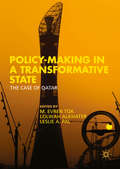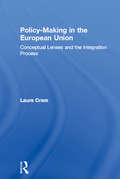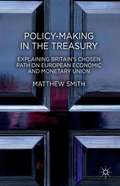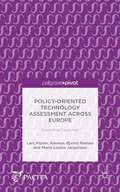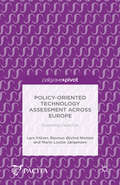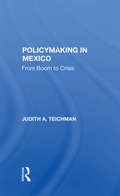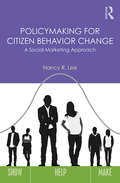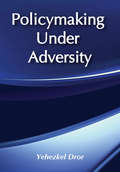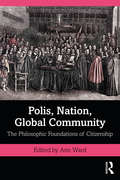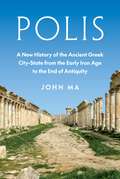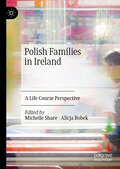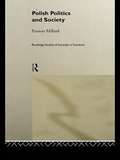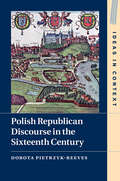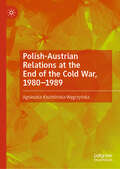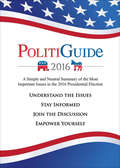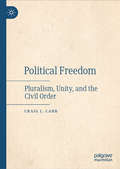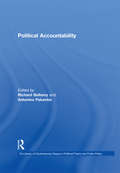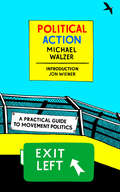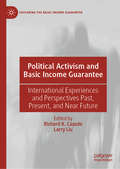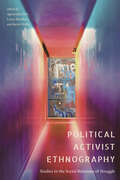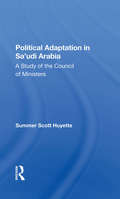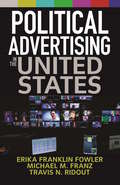- Table View
- List View
Policy-Making in a Transformative State
by M. Evren Tok Lolwah R. M. Alkhater Leslie A. PalThis book explores, in a series of detailedcase studies, how public policy is actually made in Qatar. While Qatar is aGulf monarchy, its governance is complex. Other analysts have tried to come togrips with this complexity using qualified descriptions of the system such as 'late rentier,' 'pluralized autocracy,' 'tribal democracy,' or 'softauthoritarian. ' The authors of the volume use the lens of a transformative state. Qatar is deliberatelyengaged in a rapid process of radical economic and societal transformation. That process has its contradictions and tensions, particularly with regards toachieving a balance between Islam, social traditions, and modernity. This book explores how it also has a specific policy dynamic of generating ideas and institutions,developing policy and program designs, implementation and coordination.
Policy-Making in the European Union: Conceptual Lenses and the Integration Process (Routledge Research in European Public Policy)
by Laura CramLaura Cram takes a fresh view at attempts to conceptualize the process of European integration. Her book explores the impact of the day to day work of policy maker, interest groups and bureaucrats in influencing the environment in which European Treaty formulation and ratification are taken.She sheds new light on the wide range of policy areas in which institutions such as the Commission of the European Union and the European Court of Justice have succeded in expanding the scope of EU competence despite national government opposition.
Policy-Making in the Treasury
by Matthew SmithGoing behind the doors of the Treasury and Number 10, this book explores why successive British Prime Ministers from Callaghan to Blair have been hesitant towards European Economic and Monetary Union. It uses official documents and interviews with former ministers to understand discussions that took place at the heart of government.
Policy-Oriented Technology Assessment Across Europe: Expanding Capacities
by Lars Klüver Rasmus Øjvind Nielsen Marie Louise JørgensenPolicy-Oriented Technology Assessment Across Europe.
Policy-Oriented Technology Assessment Across Europe: Expanding Capacities
by Lars Klüver Rasmus Øjvind Nielsen Marie Louise JørgensenThis book is open access under a CC-BY license. Policy-making to address grand challenges faces greater complexity than any previous project of modernization. Future scenarios are haunted by uncertainty and there is real ambivalence as to the values that policy should strive for. In this situation decision-makers look to research and innovation to provide answers and solutions. But neither can the great transitions ahead be planned by science, nor will conventional methods of innovation bring such transitions about. A turn to interactive governance is therefore underway with policy-makers and citizens becoming increasingly involved in processes of deliberating futures. Technology Assessment (TA) is the art of structuring such processes. TA goes beyond traditional expert policy analysis by systematically combining a multi-disciplinary evidence base with participatory approaches to policy deliberation. TA thus seeks to act as a hub for serious and transparent dialogue between policy, industry, science, and society about the challenges ahead and the available options for overcoming them responsibly. This volume offers an up-to-date account of the expansion of technology assessment capacities across new European member states. The contributions of this volume are written by leading European researchers and practitioners in technology assessment (TA) and are based on the PACITA (Parliaments and Civil Society in Technology Assessment) project.
Policymaking In Mexico: From Boom To Crisis (Thematic Studies In Latin America)
by Judith TeichmanThis book is a study of economic policymaking in Mexico focusing upon the sexenio (the six-year term) of Lopez Portillo—the era of the petroleum boom, the 1982 economic crisis, and the eventual bank nationalization.
Policymaking for Citizen Behavior Change: A Social Marketing Approach
by Nancy R. LeeSocial marketing is a discipline unfamiliar to many policymakers, often confused with the more frequently applied and studied fields of social media, behavioral economics, or social change. Social marketing is a growing field and methodology, however, that has been successfully applied to improve public health, prevent injuries, protect the environment, engage communities, and improve financial well-being. Policymaking for Citizen Behavior Change is designed to demonstrate the ways in which social marketing can be an effective and efficient tool to change citizens’ behavior, and how to advocate for and support its appropriate application. Providing a 10-Step Planning Model and examining a variety of social marketing cases and tools, including more than 40 success stories, Policymaking for Citizen Behavior Change is core reading for current policymakers, as well as all those studying and practicing social marketing, particularly in the public sector. It’s also worthwhile supplementary reading for those studying public policy, public administration, environmental justice, public health, and other programs on how to effect social change.
Policymaking under Adversity
by Yehezkel DrorThis groundbreaking study systematically treats recent policymaking trends, starting with a reconsideration of salient theoretical issues of policymaking and its study and culminating with a survey of current policy-related predicaments in various countries. Dror proposes that the task for social science research is to uncover underlying causes of policymaking inadequacies. Standard research methods, Dror states, have been unable to uncover the realities of important decisions made inside governments. In order to gain an understanding of pressing predicaments, he believes that policymakers need to examine the foundations of contemporary practices of present assumptions, and that they need a multiplicity of approaches to policymaking.After prescribing a set of requirements that policymaking must satisfy in order to adequately respond to challenges, Dror posits several improvements needed in education and in policy decision making. The book concludes with an extensive bibliography, including numerous important German works not found in other English-language studies. This book supplements the earlier basic theory and models propounded in Dror's Public Policymaking Reexamined by dealing with current trends. As a guide to public policy literature and related works, it will be invaluable to students and practitioners.
Polis, Nation, Global Community: The Philosophic Foundations of Citizenship
by Ann WardThis book examines the basic tenets of nation, nationalism and citizenship. It explores the relevance of the nation-state to human freedom and flourishing, as well as the concept of citizenship that it implies, in contrast to that of the ancient polis and the "global community." The volume focusses on the shifting notions of various political concepts over time to present a systematic understanding of core concepts such as polis, nation and state from antiquity to the present. It includes contributions that analyze ancient and modern thought, and sections that address postmodern and contemporary thinkers, including Aristotle, Cicero, Hobbes, Locke, Rousseau, Tocqueville, Nietzsche, Arendt, Weil, Grant and Manent. A comprehensive handbook to introductory politics, this book will be invaluable to students and teachers of political science, especially political theory, political philosophy, democracy, political participation and international relations theory.
Polis: A New History of the Ancient Greek City-State from the Early Iron Age to the End of Antiquity
by John MaA definitive new history of the origins, evolution, and scope of the ancient Greek city-stateThe Greek polis, or city-state, was a resilient and adaptable political institution founded on the principles of citizenship, freedom, and equality. Emerging around 650 BCE and enduring to 350 CE, it offered a means for collaboration among fellow city-states and social bargaining between a community and its elites—but at what cost? Polis proposes a panoramic account of the ancient Greek city-state, its diverse forms, and enduring characteristics over the span of a millennium.In this landmark book, John Ma provides a new history of the polis, charting its spread and development into a common denominator for hundreds of communities from the Black Sea to North Africa and from the Near East to Italy. He explores its remarkable achievements as a political form offering community, autonomy, prosperity, public goods, and spaces of social justice for its members. He also reminds us that behind the successes of civic ideology and institutions lie entanglements with domination, empire, and enslavement. Ma&’s sweeping and multifaceted narrative draws widely on a rich store of historical evidence while weighing in on lively scholarly debates and offering new readings of Aristotle as the great theoretician of the polis.A monumental work of scholarship, Polis transforms our understanding of antiquity while challenging us to grapple with the moral legacy of an idea whose very success centered on the inclusion of some and the exclusion of others.
Polish Families in Ireland: A Life Course Perspective
by Alicja Bobek Michelle ShareThis volume explores the family formation and life course of Polish people in Ireland, who make up the largest immigrant group in Ireland. Chapters address key dimensions of the life course in three parts focusing on childhood and youth, adulthood and parenting, and mid-life and futures. Contributions investigate the experiences of children and youth attending school and understanding their identities, the changing nature of families and family support, how families might engage with welfare institutions, and more. Through the life course approach, the book moves beyond the paradigm of studying the Polish population as economic migrants and instead analyzes and illustrates the lives of Polish families living in Ireland since EU enlargement.
Polish Politics and Society (Routledge Studies of Societies in Transition #No.12)
by Frances MillardAn examination of political, social and economic development in Poland since the summer of 1989, with the main focus on democratization.
Polish Republican Discourse in the Sixteenth Century (Ideas in Context #129)
by Dorota Pietrzyk-ReevesExploring republican ideas and concepts that developed in sixteenth-century Poland under the impact of humanism and the Renaissance, as well as political and constitutional changes, this is a landmark study of republican discourse in sixteenth-century Poland-Lithuania. It provides a conceptual and contextual analysis of the rich political literature and debate which animated intellectual life and political reasoning during the Polish-Lithuanian Commonwealth and effectively demonstrates its republican character. Using a comparative perspective, Dorota Pietrzyk-Reeves situates the Polish republican discourse within both the classical and early modern republican traditions, bringing together contexts and ideas that have traditionally been overlooked by scholars of early modern Europe. In addition, it also underlines the originality of Polish concepts such as the relationship between law, liberty and virtue as key elements of a well-ordered commonwealth and the vision of a mixed respublica that also had a monarchical character. This book is an invaluable resource for anyone interested in European intellectual history and the early modern republican tradition.
Polish families and migration since EU accession
by Anne WhiteBased on 115 interviews with Polish mothers in the UK and Poland, as well as a specially-commissioned opinion poll, this topical book discusses recent Polish migration to the UK. In a vivid account of every stage of the migration process, the book explores why so many Poles have migrated since 2004, why more children migrate with their families and how working-class families in the West of England make decisions about whether to stay. With a fully revised introduction for the paperback edition, it covers many broader themes - including livelihoods and migration cultures in Poland, experiences of integration into UK communities and issues surrounding return to Poland. This book is highly relevant to migration policy across Europe and beyond. It will be of interest to policy-makers and the general public as well as students and scholars. Winner of the BASEES George Blazyca Prize 2011.
Polish-Austrian Relations at the End of the Cold War, 1980–1989
by Agnieszka Kisztelińska-WęgrzyńskaThis book proposes a new historical framework for the analysis of the relationship between communist Poland and neutral Austria during the final decade of the Cold War. The tragic Polish crisis of 1980–1982 is examined within the context of Poland’s relationship with the wealthy, neutral country of Austria. By exploring the political meetings and negotiations that took place around the introduction of martial law in Poland, this book sheds light on Polish-Austrian bilaterial relations as seen from the perspective of Polish diplomatic documents. Divided into three parts, the book begins by illustrating Austria’s attitude to reforms in Poland in the early 1980s. The second part focuses specifically on the imposition of martial law in Poland, and the third part explores the cooperation between the two countries through the form of investments and environment protection. Particular emphasis is placed on Polish attempts to recruit Austrian politicians in order to overcome the political isolation in which Warsaw found itself after December 13, 1981. The author analyses the political boundaries that Austria could, and wanted to, cross, in order to help the Polish regime, offering insights into Austria’s fears of financial loss as a result of the collapse of the regime.
Polite Anarchy in International Relations Theory
by Zaheer KazmiAn innovative re-evaluation of the concept of anarchy in theorizing diplomacy between states which draws on a historically sensitive re-evaluation of the ideological uses of politeness in the anarchist thought of William Godwin.
Politeia in Greek and Roman philosophy
by Melissa Lane Verity HarteThis is the first exploration of how ideas of politeia (constitution) structure both political and extra-political relations throughout the entirety of Greek and Roman philosophy, ranging from Presocratic to classical, Hellenistic, and Neoplatonic thought. A highly distinguished international team of scholars investigate topics such as the Athenian, Spartan and Platonic visions of politeia, the reshaping of Greek and Latin vocabularies of politics, the practice of politics in Plato and Proclus, the politics of value in Plato, Aristotle and the Stoics, and the extension of constitutional order to discussions of animals, gods and the cosmos. The volume is dedicated to Professor Malcolm Schofield, one of the world's leading scholars of ancient philosophy.
PolitiGuide 2016: A Simple and Neutral Summary of the Most Important Issues in the 2016 Presidential Election
by Julian Rudolph Kyle Hackel"PolitiGuide 2016" offers the reader a simple, unbiased, and &“to the point&” discussion of the 2016 Election. In a short and succinct style, "PolitiGuide 2016" provides a clear understanding of the general stances that Democrats and Republicans take on issues such as the economy, abortion, global warming, healthcare, and more. With so much misinformation, misperception, and general discussion surrounding a Presidential election, "PolitiGuide 2016" serves to empower voters and enable them to join the political discussion. In addition, readers of "PolitGuide 2016" will walk away with the ability to understand the &“less talked about issues&” like Marijuana and Race Relations, while also feeling more comfortable about topics like: how to register to vote and what to expect on voting day.
Political Freedom: Pluralism, Unity, and the Civil Order
by Craig L. CarrThe purpose of this work is to discuss and explain the nature of political freedom. The approach is interdisciplinary, drawing from social theory, history, and law, as well as philosophy and political theory. The argument presented defends a view of political freedom as a social norm that has gained great prominence in those places where it has emerged through time as a social mechanism that supports social order and brings security to social life. Regarded as a social norm, political freedom promotes the toleration of the religious, cultural, ideological, and moral differences that generate normative conflict throughout society. The resultant understanding of political freedom therefore defends a distinction between political and personal freedom and separates the idea of political freedom from the individualism with which it is normally associated in most philosophical literature. The argument also indicates why it is appropriate to regard political freedom as a central virtue of social justice.
Political Accountability (The Library of Contemporary Essays in Political Theory and Public Policy)
by Antonino PalumboPolitical accountability forms a cornerstone of modern democracy: it directs the political system towards the public interest and allows the exercise of the principles of autonomy and self-determination that lie at the core of democratic politics. Sadly, existing democracies, with their large, centralized bureaucracies, have evolved in ways that progressively undermine the ability of citizens to keep their representatives accountable and political regimes responsive. Far from reversing this trend, the neoliberal reforms introduced since the 1980s have increased that accountability gap. Globalization and the alleged passage from 'government' to 'governance' have aggravated the problem further. The notion of accountability that survives these changes is a problematic form of auditing carried out by a constellation of quangos, autonomous agencies and NGOs whose own accountability is problematic. This volume collects the main contributions to current debates on political accountability. It explores the challenges traditional conventions of accountability face today at the domestic, trans- and international levels and indicates the distinctive solutions those challenges require.
Political Action: A Practical Guide to Movement Politics
by Michael Walzer Jon WienerPolitical theorist Michael Walzer's classic guide is a perfect introduction to social activism, including what-to-do advice for deciding which issues to take on, organizing, fundraising, and providing effective leadership Political Action is a how-to book for activists that was written at one of the darkest moments of the Nixon administration and remains no less timely and intelligent and useful today. Michael Walzer draws on his extensive engagement in the civil rights and antiwar movements of the 1960s to lay out the practical steps necessary to keep movement politics alive both in victory and in defeat. What do people need to do when out of outrage or fear of looming disaster they come together to demand change? Should they focus on one or several issues? Should they form coalitions? What can and can’t be accomplished through electoral politics? How can movements operate democratically? What is effective leadership? Walzer addresses such questions with clarity, concision, wisdom, and wit in a book that everywhere insists not only on the centrality of movement politics to the health of democratic societies but on the deep satisfaction that is to be found there. Political Action is both an indispensable resource for activists and a lasting and inspiring summons to arms.
Political Activism and Basic Income Guarantee: International Experiences and Perspectives Past, Present, and Near Future (Exploring the Basic Income Guarantee)
by Richard K. Caputo Larry LiuThis edited volume brings together international and national scholars and major activists leading or spearheading basic income guarantee political initiatives in their respective countries. Contributing authors address specific issues about major efforts to influence public policy regarding basic income guarantee, such as: who were the main advocates and thought leaders involved in support of such legislative initiatives; what were the main organizational and framing strategies and tactics used to influence public opinion and elected officials to support the idea of and policies related to basic income guarantee; what were the major obstacles they faced; and what practical and theoretical lessons might be learned from past and contemporary actions to affect social policy change regarding basic income guarantee and related measures to guide the efforts of activists and public intellectuals in the 2020 and 2024 election cycles.
Political Activist Ethnography: Studies in the Social Relations of Struggle
by Kevin Walby Agnieszka Doll Laura BisaillonAs activists strategize, build resistance, and foster solidarity, they also call for better dialogue between researchers and movements and for research that can aid their causes. In this volume, contributors examine how research can produce knowledge for social transformation by using political activist ethnography, a unique social research strategy that uses political confrontation as a resource and focuses on moments and spaces of direct struggle to reveal how ruling regimes are organized so activists and social movements can fight them. Featuring research from Aotearoa (New Zealand), Bangladesh, Canada, Poland, South Africa, and the United States on matters as diverse as anti-poverty organizing, prisoners' re-entry, anti-fracking campaigns, left-inspired think-tank development, non-governmental partnerships, involuntary psychiatric admission, and perils of immigration medical examination, contributors to this volume adopt a “bottom-up” approach to inquiry to produce knowledge for activists, not about them. A must-read for humanities and social sciences scholars keen on assisting activists and advancing social change.
Political Adaptation In Sa'udi Arabia: A Study Of The Council Of Ministers
by Summer S HuyetteExamining the evolution of the Sa'udi government from 1901 to 1983, a period of major social and political transformation, Dr, Huyette looks at the ways in which a traditional elite, the Al Sa'ud, has managed to surmount the formidable obstacles of tribal and regional differences compounded by rapid modernization. The Council of Ministers, formed in 1953, is one method developed by the Sa'udis to cope with these problems and represented the first step toward a national administrative system. Dr. Huyette traces the Council's antecedents as well as the changes in its membership, procedures, and responsibilities and the concomitant changes in the political elite and its style of leadership.
Political Advertising In The United States
by Michael M. Franz Erika Franklin Fowler Travis N. RidoutPolitical advertising is as important as ever--ad spending records are broken each election cycle, and the volume of ads aired continues to increase.<P><P> Political Advertising in the United States is a comprehensive survey of the political advertising landscape today. The authors analyze the major trends in advertising in both presidential and congressional elections and the effect political ads have on voters--from the impact of today's regulatory environment on the sponsorship and content of political advertising, to how data analysis has allowed for more sophisticated targeting and how the rise of the Internet and social media has changed the distribution of ads. <P>The authors, co-directors of the Wesleyan Media Project, draw from the most up-to-date data on political advertising to illustrate and support their arguments. Written in an accessible and easy to understand manner, this is a book that will appeal to students, scholars and political practitioners.
